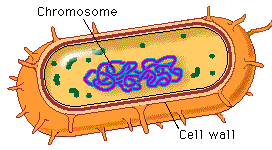

Escherichia coli is the most common bacterium in the human gut. It has been extensively studied in the laboratory and is an important research organism for molecular biology.
E. coli reproduce very rapidly; a single microscopic cell can divide to form a visible colony with millions of cells overnight. Like all bacteria, E. coli has no nuclear envelope surrounding the bacterial chromosome and thus no true nucleus. All of the genes required for basic survival and reproduction are found in the single chromosome. Some E. coli cells also contain plasmids, small DNA molecules that carry genes for certain specialized functions, including resistance to specific drugs.
![]() Continue to Plasmids.
Continue to Plasmids.